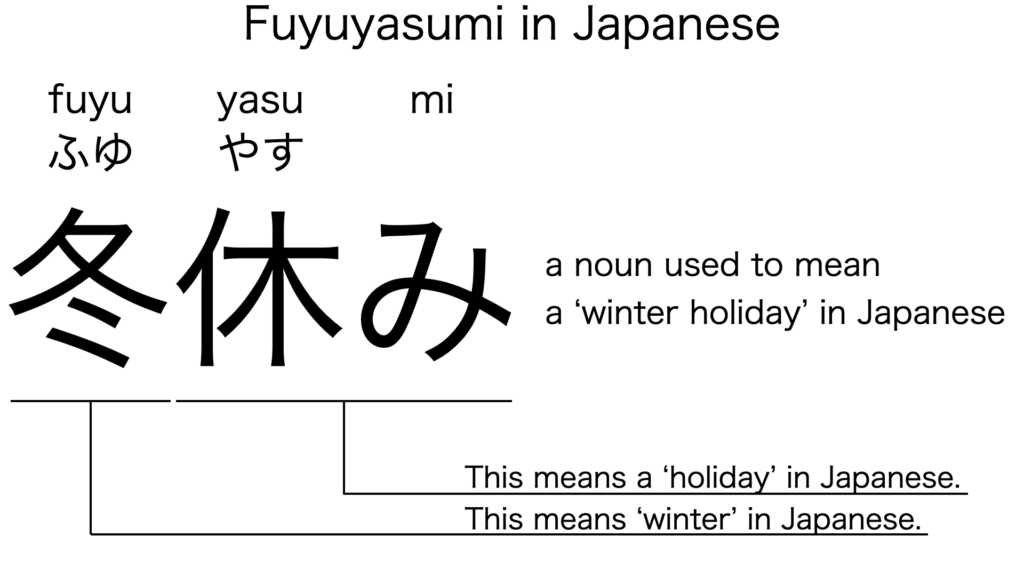What does “fuyuyasumi” mean in Japanese?
Native speakers use fuyuyasumi to mean a ‘winter holiday’ in Japanese. Perhaps, some Japanese learners know this word as it is sometimes used in Japanese conversations. In this blog post, however, I’m explaining this word in detail based on its kanji mixed expression. And also, I’m explaining how to use it through example sentences. My explanations would help Japanese learners understand fuyuyasumi more clearly. Then, let’s get started!
Contents
Definition and meaning of “fuyuyasumi”
Let me start with the definition and meaning of fuyuyasumi.
- fuyuyasumi – 冬休み (ふゆやすみ) : a noun used to mean a ‘winter holiday’ in Japanese. This can also work as plural. Learn more about Japanese plural.
The definition and meaning are simple and clear. To understand this noun more clearly, however, let me explain its kanji mixed expression in detail.
Fuyuyasumi in kanji
The kanji mixed expression of fuyuyasumi consists of the following two parts:
- fuyu – 冬 (ふゆ) : a noun used to mean ‘winter’ in Japanese.
- yasumi – 休み (やすみ) : a noun often used to mean a ‘holiday’ in Japanese.
From these two parts, we can understand that fuyuyasumi literally means a ‘winter holiday’ in Japanese. This literal interpretation is completely in line with the actual meaning.

When we meet new kanji expressions, we should check their kanji characters in detail to understand their meanings clearly and deeply. In many cases, kanji characters tell us a lot about the meanings of the expressions they form. Actually, here, we could get the better understanding of fuyuyasumi through the detailed kanji check above.
So far, I’ve explained the definition and meaning of fuyuyasumi together with its kanji characters. Then, let me explain how to use it through the example sentences below.
How to say “winter holiday” in Japanese
boku wa fuyuyasumi ga tanoshimi desu – 僕は冬休みが楽しみです (ぼくはふゆやすみがたのしみです)
I’m looking forward to my winter holiday.
Below are the new words used in the example sentence.
- boku – 僕 (ぼく) : a pronoun meaning ‘I’ in Japanese. This is used mainly by boys and young males.
- wa – は : a binding particle working as a case marker or topic marker. In the example, this works after boku to make the subject in the sentence.
- ga – が : a case particle used to make the subject word or the object word in a sentence. In the example, this is used after fuyuyasumi to make the object in the sentence.
- tanoshimi – 楽しみ (たのしみ) : a noun, but often used to mean ‘to be looking forward’ in Japanese.
- desu – です : an auxiliary verb used after a noun or adjective to make it polite. Probably, this is well known as a part of the Japanese desu form. In the example, this is used after tanoshimi to make it sound polite.
This is a typical usage of fuyuyasumi. In this example, it works together with ga and tanoshimi to mean ‘to be looking forward to my winter holiday’ in Japanese.
Another example of “fuyuyasumi”
demo fuyuyasumi wa sugu owari masu – でも冬休みはすぐ終わります (でもふゆやすみはすぐおわります)
But the winter holiday will be over soon.
Below are the new words used in the example sentence.
- demo – でも : a conjunction used to mean ‘but’, ‘however’, or such in Japanese.
- sugu – すぐ : an adverb used to mean ‘soon’, ‘quickly’, or such in Japanese.
- owari – 終わり (おわり) : one conjugation of the verb, owaru, which means ‘to end’, ‘to finish’, ‘to be over’, or such in Japanese. In the example, it has been conjugated for the better connection with its following word.
- masu – ます : an auxiliary verb used after a verb to make it polite. Probably, this is well known as a part of the Japanese masu form. In the example, this is used after owari to make it sound polite.
This is another example of fuyuyasumi. In this example, it works together with wa to become the subject in the sentence. When we want to mean a ‘winter holiday’ in Japanese, anyway, this noun is always a very good option.
Summary
In this blog post, I’ve explained the definition and meaning of fuyuyasumi in detail based on its kanji mixed expression. And also, I’ve explained how to use it through the example sentences. Let me summarize them as follows.
- fuyuyasumi – 冬休み (ふゆやすみ) : a noun used to mean a ‘winter holiday’ in Japanese. This can also work as plural. This noun consists of two parts, fuyu and yasumi, which literally mean a ‘winter holiday’ in Japanese. This literal interpretation is completely in line with the actual meaning.
Hope my explanations are understandable and helpful for Japanese learners.
Leave a Reply